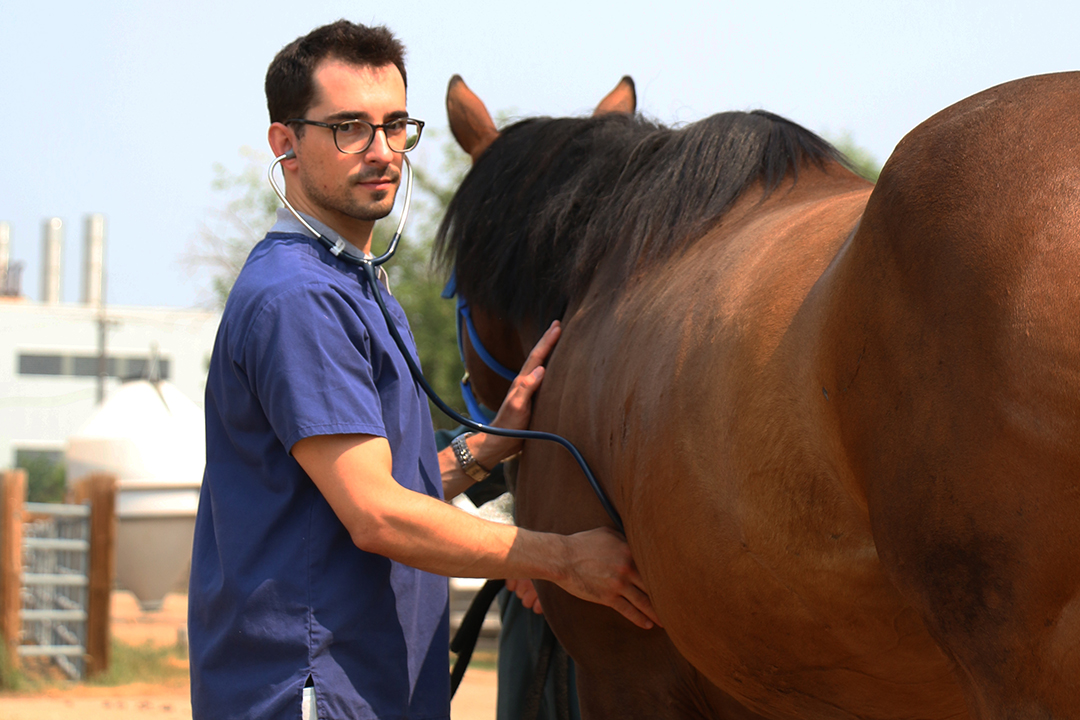
Vet's career heads straight to the heart
Growing up in Portugal, Dr. Tiago Afonso always knew he wanted to be an equine veterinarian.
By Jessica Colby“My uncle had a farm with horses, and he’s a mixed veterinarian in the back country of Portugal,” says Afonso, an assistant professor in the Western College of Veterinary Medicine’s (WCVM) Department of Large Animal Clinical Sciences. “I used to spend all my weekends and summers there and that was the life I wanted. To be out with the animals in the field, in the country.”
Aside from riding horses on the farm, Afonso helped his uncle with veterinary surveillance sampling of dogs, sheep and cattle. As his uncle was the province’s veterinarian, Afonso used to join him for similar surveillance work across the region in Portugal.
“I really like the biology and the animal part of everything and how everything works and all the organisms,” says Afonso, who was never really interested in human medicine as a career. “[It] was just [the] lifestyle I wanted for me.”
As well, Afonso became interested in cardiology — a subject that always made sense to him, even in middle school.
“Cardiology was always a subject that was easy to me for some reason,” says Afonso. “Combining both, that’s what led me to this — and then I was fortunate enough during my post-veterinary student life to always work with equine cardiologists.”
Afonso received his Doctor of Veterinary Medicine (DVM) from the University of Lisbon in Portugal. After graduating, he completed two clinical internships — one in Belgium and one at the University of Guelph’s Ontario Veterinary College.
Afonso went on to study at the University of Georgia’s College of Veterinary Medicine in Athens, Ga., where he completed his PhD in equine cardiology and a three-year residency program in large animal internal medicine. Once he graduated in 2016, Afonso also became a board-certified specialist (large animal internal medicine) that same year.
Three of the four research studies that Afonso completed during his PhD program centred on angiotensin-converting enzyme (ACE) inhibitors in horses.
“We compared four different ones and then we concluded that benazepril was the best one. It seemed to be the most efficient one from the ones we used,” says Afonso. “The problem with benazepril is that it is generic and cheap in the U.S., but it is cost prohibitive here in Canada and [in] Europe, Australia, New Zealand.”
After leaving Georgia, Afonso spent time in Australia — at a private practice and lecturing at the University of Adelaide — and in New Zealand where he lectured at Massey University in Palmerston North, N.Z.
When a WCVM faculty position came available in 2019, Afonso took the opportunity to return to North America. The move allowed his wife, who is originally from the U.S., to be closer to home and to complete her PhD. At the WCVM, Afonso hopes to continue working on methods for controlling cardiac disease in horses and developing treatments for horses suffering from heart problems.
Besides research and clinical work, Afonso teaches veterinary students in the WCVM’s DVM program. In October 2020, Afonso received the Canadian Veterinary Medical Association (CVMA) Teacher of the Year Award for the WCVM. Selected by veterinary students, CVMA award recipients are teachers who have “inspired [the students] by their approach to the subject, teaching methods and enthusiasm.”
“I interacted with students on a daily basis, and I really enjoyed explaining things to them,” says Afonso.
“It’s good to be surrounded by other people. People that are interested in wanting to learn — it’s always good and motivates you.”
Click here to read more about Dr. Tiago Afonso's current research work.
Jessica Colby of Montmartre, Sask., is a University of Regina journalism student. She worked at the WCVM as a summer research communications intern in 2021.
